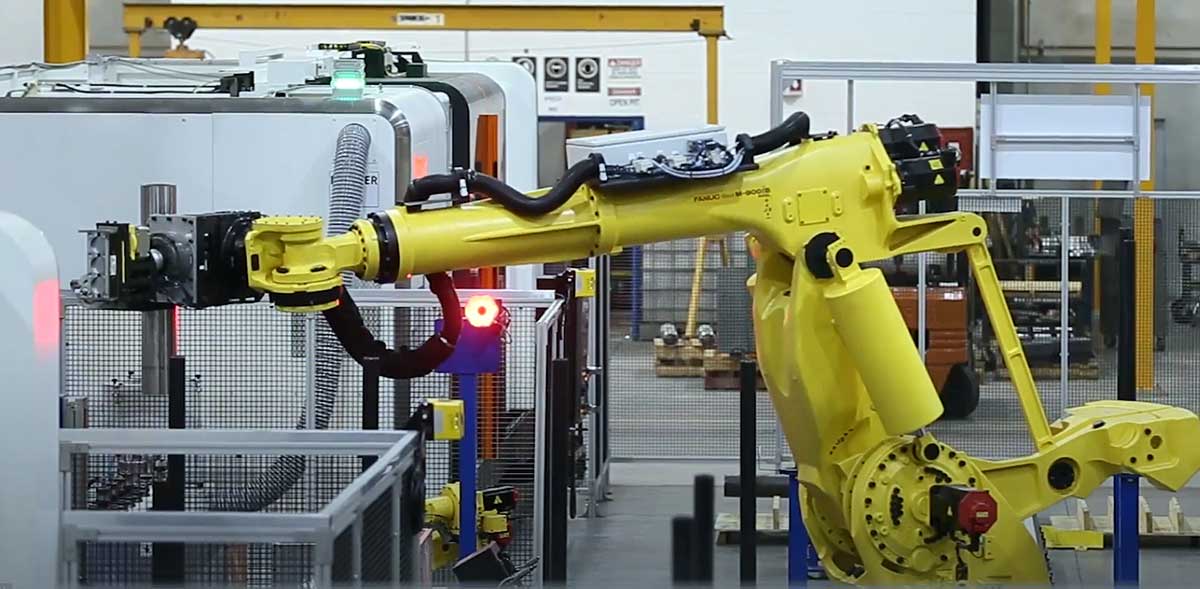The Advantages of CNC Machine Automation
Whenever you order precision-machined components, you want to be confident that your service provider can give you the quality and consistency you need at a competitive price. A facility that utilizes cutting-edge technologies has the highest chance of meeting your needs.

We already know manufacturing facilities are in a constant uphill battle against rising production costs, higher customer demands, and stronger competition from the market. Add to that a fragile supply chain, unpredictable geopolitical events, a looming recession — and it’s clear why companies need reliable manufacturing they can count on.
To lower operational costs while maintaining high productivity, many CNC machining organizations are moving away from conventional machining and
turning to modern technologies like CNC machine automation to meet these new challenges.
And the numbers don’t lie. Reports as recent as 2021 indicate that the global industrial automation market will grow to
USD$395.09 billion by 2029.
Learn about how the CNC sector is applying automation and make sure that the supplier you choose doesn’t overlook the advantages of automated CNC.
What Is the Role of Automation in CNC Machining?
Automation involves using robotic solutions to complete tasks that the company would otherwise allocate to skilled workers operating manual machines. Even in complicated CNC procedures, automation allows the factory to continue running with minimal human intervention.
CNC machines come in many forms. Some are involved in milling, injection molding, and plasma cutting and can use materials ranging from heavy metals to plastics. Such a varying environment sounds like a difficult field for automation to take hold. However, recent advances in technology and techniques have rendered today’s automation solutions flexible enough to apply themselves to most CNC workflows.
Automation ensures economical long-term production with consistent quality standards, especially if the factory produces large batch sizes. But even smaller batch sizes benefit from automation, thanks to its high degree of accuracy no matter how complicated the final product is.
What Advantages Do Automated CNC Machines Bring?
The benefits of CNC automation extend beyond the factory floor and help out downstream processes as well, culminating in a better experience for clients. Manufacturing
facilities that adopt these solutions see a return on their investments within a few years in the form of more satisfied clients and stronger sales.
Why is CNC automation so vital to success nowadays? The advantages below tell the whole story.
Increased Production Output
Because it runs independent of human intervention, automation maximizes the uptime of the machines. A factory might even run 24 hours a day for 7 days a week without any breaks or off-hours. Automation either increases production capacity for large batches of the product or economically handles multiple runs of small batches.
Some companies even automate other tasks like loading in the right workpieces and managing pallet storage. CNC automation solutions can execute multiple tasks like these simultaneously. The result is a complete network of machines working together to automate the entire production line.
Some studies even report that machine shops using robotic automation produce
47% more parts an hour than ones that don’t.
Quality Assurance and Excellence
Automation solutions also boast consistency. Impervious to fatigue or human error, these solutions always provide high-quality work for high-precision tasks like injection molding. They allow machines to pick up, transfer, and orient delicate parts gently while protecting painted or polished parts from damage.
In response to rising expectations from customers in this sector, it’s no wonder why the CNC machining market embraces automation.
Less Room for Errors
An automated CNC machine matches your exact specifications with incredible precision
every time. Skilled operators use convenient menus and user interfaces to program the correct design parameters and precisely schedule machining tasks.
Operators can also save those parameters to memory. Even if the facility suspends a machining
project temporarily, it can pick it back up immediately with no loss in design fidelity.
Automation also helps manage resources so that specific tools or raw materials don’t run out in the middle of production.
Cost Reduction
All these benefits won’t cost you a fortune; they’ll likely contribute to better pricing for the customer since operating costs are now lower.
Factories optimize how they use their machinery in the long term. Because automation keeps machines running continuously and decreases idle time, facilities don’t have to spend as much on tooling investments and can afford to buy fewer machines in general, which saves space on the factory floor.
The cost reduction also extends to personnel expenditures. Facilities replacing their manual machining processes allow employees to focus on other aspects of the job instead. And in the face of potential worker shortages, these companies also have more leverage by allowing one machine operator to handle multiple CNC production lines simultaneously.
It’s worth noting, though, that many companies using automation end up hiring more staff anyway when they can afford to scale up operations accordingly.
Don’t forget about reduced waste. More precise cuts mean the production line produces less waste per piece.
These savings, on top of increased yield, render automation a “no-brainer” solution, even in the face of market pressure and the cost of raw materials. That return on investment also comes swiftly, thanks to robotic automation’s fast deployment time.
Safer Working Environments
Compliance is always a factor when deciding on third-party partnerships. If one of your suppliers faces a workplace injury, the incident also reflects badly on your business.
The most common sources of workplace injury in machining factories are long-term repetitive tasks and lifting heavy objects. An automated CNC machining facility is a safer one as a result since automation systems replace many of the less safe aspects of production.
An operator takes on more fulfilling strategic and managerial tasks while the machines cover the “heavy” work on the factory floor. This setup keeps human employees away from toxic or abrasive substances and potentially dangerous byproducts like heat and sparks. At most, employees will only be responsible for temporary routine maintenance.
Higher Employee Morale
Staff morale will likewise go up as a result of automation. Employees no longer need to spend time on tedious tasks and can focus on career advancement and providing valuable service to their production lines. If employee satisfaction rises, the facility’s general productivity and reliability rises with it.
And the fears that automation will result in fewer jobs in the future are largely unfounded. An OECD report shows us that
employment will still rise even as automation takes hold in many industries.
Streamlined Operations
It’s possible to automate not only production but also downstream processing. CNC factories can now move the finished products into place on stacks or pallets immediately, creating a buffer that accelerates the manufacturing line.
Automated CNC machines will operate in a network, handling almost the entire process autonomously. Suppliers can then prepare shipments for their customers more quickly than ever.
Adaptability
Whereas human employees might need training if the factory’s procedures change, machine automation quickly picks up on new parameters. This benefit comes with a variety of use cases.
- Quick adaptation to new parameters. If you ever send in an unfamiliar job request or non-standard specifications, all it takes is a bit of reprogramming to get started on the right foot.
- Integrating additional steps. Integrating auxiliary processes into an automated production line—such as washing, marking, and applying finishes—is also easier.
- More specific orders. Instead of working exclusively on large, bulk orders, facilities can now work on smaller batches on-demand for more detailed orders.
CNC machining companies also won’t have to outsource as many tasks now, thanks to the adaptability of automation.
Generating Valuable Insights
Manufacturers have an opportunity to excel in their production processes through data collection and analysis. Sensors around the factory capture and analyze live data on each CNC machine’s performance.
Instead of suffering a breakdown in the middle of an important order, the facility can predict problems ahead of time and proactively address them.
Better Contract Terms
There are numerous advantages to a more streamlined manufacturing process, including enhanced cost-savings and boosted productivity. As machining parts become more economical, vendors are able to purchase more, improving their ability to scale and upsell their own products and services.
Negotiating better contract pricing is also an option now that facilities use automation to determine exact expenditures and production timelines.
Interested in CNC Automation? Partner with GN, a Leader in the Manufacturing Industry
Automation is seeing widespread use in CNC machining, as it makes facilities exceptionally productive, cost-effective, safer, and more adaptable.
GN Corporations is an industry-leading manufacturer of specialized parts in a variety of industries, including
aerospace,
defense,
automotive,
technology,
oil & gas
, and more. And with full GN 4.0 support, we can help your company overcome its manufacturing bottlenecks.
Are you looking to partner with an industry leader in manufacturing? Discover what precision and reliability looks like by partnering with GN Corporations.






